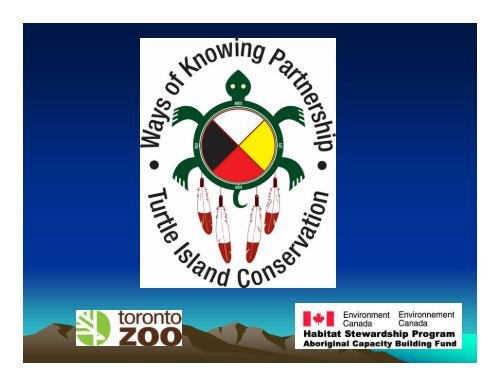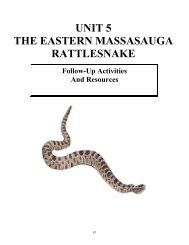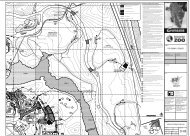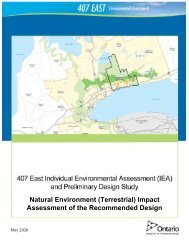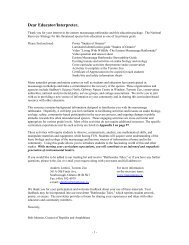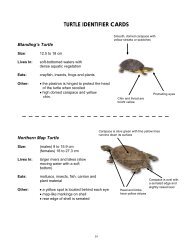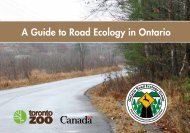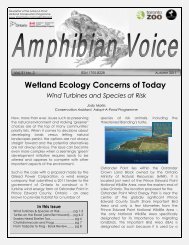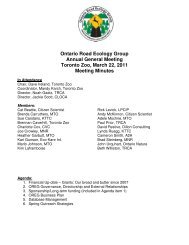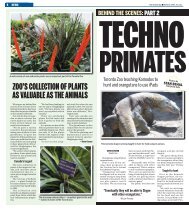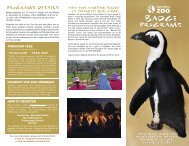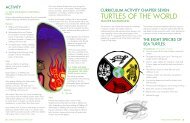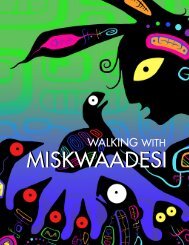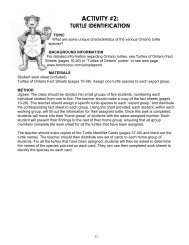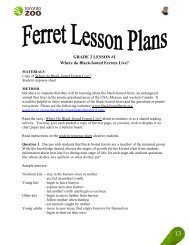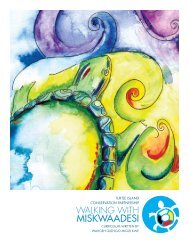Ways of Knowing Partnership - Toronto Zoo
Ways of Knowing Partnership - Toronto Zoo
Ways of Knowing Partnership - Toronto Zoo
You also want an ePaper? Increase the reach of your titles
YUMPU automatically turns print PDFs into web optimized ePapers that Google loves.
Who are we?<br />
We are community mandated and work with<br />
our FN advisors to support community<br />
conservation programs<br />
Advisors:<br />
Jacqueline Daigle Moore-Queens University<br />
Dan Longboat-Trent University<br />
Shirley Williams-Trent University<br />
Kate Freeman-Queens University<br />
Eileen Conroy-My Community Bridge<br />
Henry Lickers-Akwesasne<br />
Callie Hill-FNTI<br />
Stephanie Roy-Kenjgewin Teg Institute<br />
Jan Hill-FNTI
Vision<br />
Traditional Knowledge will foster and guide<br />
communities for seven generations<br />
Mission<br />
Develop <strong>Ways</strong> <strong>of</strong> <strong>Knowing</strong> <strong>Partnership</strong>s
Foster respect for self, community, Mother<br />
Earth, and the Creator<br />
• Link FN community, youth,<br />
knowledge keepers and Elders<br />
• Preserve and respect TK and<br />
ceremony<br />
• Assist in establishing cultural<br />
centers as repositories for<br />
community knowledge
Recognize and record significant<br />
landscapes valued by FN<br />
communities<br />
• <strong>Ways</strong> <strong>of</strong> <strong>Knowing</strong> Guide will facilitate sharing <strong>of</strong><br />
community knowledge<br />
• Valuing landscapes, teachings, and community<br />
history to preserve Traditional Knowledge<br />
• Create ways <strong>of</strong> knowing “map” (visual ) as a guide<br />
to valued community landscapes
Integrate traditional ways <strong>of</strong> knowing with<br />
western science to monitor, protect, and<br />
restore landscapes<br />
• Provide opportunities for youth to value the sciences<br />
• Explore TK teachings to live sustainably and guide<br />
actions<br />
• Focus will be on SAR, interconnectedness <strong>of</strong> all things,<br />
and the importance <strong>of</strong> water and watersheds for healthy<br />
communities and wildlife<br />
• Encourage independent economic sustainability (cultural<br />
centers, knowledge trails, medicine walks)
Integrate language, art, and crafts to<br />
sustain traditional ways <strong>of</strong> knowing and<br />
living<br />
Share knowledge, language and<br />
outreach resources.<br />
For example:<br />
• Turtle Island Creation story<br />
• 13 Moons lunar guide to<br />
seasonal practices<br />
• Thanksgiving address<br />
• Wampum Belt teachings<br />
• Seven Generations as basis<br />
for Youth/Elder dialogue<br />
• Traditional Knowledge trails
Facilitate understanding <strong>of</strong> diversity <strong>of</strong><br />
FN culture and ways <strong>of</strong> knowing among<br />
non-Aboriginals<br />
• Use TZ to deliver FN message as a<br />
“meeting place”<br />
• TIC outreach to schools/communities<br />
• Nat’l Aboriginal Day celebrations<br />
• Forum for FN and non FN youth to share<br />
• Overnight camp/Leadership programme
The educational resources we produce<br />
preserve knowledge inherent in<br />
language based resources to promote<br />
stewardship <strong>of</strong> Species at Risk.<br />
• We explore the relevance <strong>of</strong> TK with<br />
regards to teachings about living<br />
sustainably with our environment and the<br />
importance <strong>of</strong> connecting with the land<br />
(and its inhabitants) on spiritual,<br />
emotional, physical, and mental levels in<br />
order to guide our practices and actions.
<strong>Ways</strong> <strong>of</strong> <strong>Knowing</strong> <strong>Partnership</strong><br />
Outcomes<br />
• <strong>Ways</strong> <strong>of</strong> <strong>Knowing</strong> Guide<br />
• School and curriculum guide to focus on<br />
youth and Elder relationships<br />
• Community landscape “map” that identifies<br />
special places to increase awareness <strong>of</strong><br />
local environment and spirit <strong>of</strong> place, guide<br />
community planning and preserve SAR<br />
• Language preservation<br />
• Cross cultural understanding
Creating Awareness…..<br />
• Outreach presentations to FN communities<br />
• Language-based SAR identifier guides<br />
• Program Information Booths at Powwows<br />
• Translated support materials<br />
• TIC (National Aboriginal Day)<br />
• Teacher resource kits<br />
• TIC Webpage<br />
• Summer Camp
Mohawk and Ojibway Identifier<br />
Guides
Frog Calls CD in Mohawk and<br />
Ojibway
Turtle Crossing signs
Powwow Information Booth<br />
Speaking with First<br />
Nations community<br />
members RE: Turtle<br />
conservation<br />
• promoting TICI<br />
• Gaining contacts and<br />
potential partners
• Turtle Island<br />
Conservation Team’s<br />
Totally Awesome<br />
Turtles presentation<br />
First Nation Youth<br />
Presentations<br />
• Help to establish<br />
dialogue between<br />
youth and Elders
Promoting Environmental Studies in<br />
First Nation Communities<br />
• Surveying and monitoring SAR<br />
• Wetland conservation<br />
• Turtle Conservation<br />
• Turtle Tally Program<br />
• Turtle Monitoring<br />
• FROGWATCH Program<br />
• Frog calls and traditional<br />
teachings CD<br />
www.torontozoo.com/adoptapond/tici.asp
Since the beginning <strong>of</strong> time…<br />
• First Nations oral traditions and cultural histories encompass long<br />
periods <strong>of</strong> time. Our own experience with the passing <strong>of</strong> time<br />
encompasses about 75 years. We live with four generations, with each<br />
generation beginning every 25 years- our own generation, that <strong>of</strong> our<br />
parents and children, and that <strong>of</strong> our grandparents and grandchildren.<br />
This shapes our perception <strong>of</strong> time. Human history in Canada began<br />
about 12,000 years ago after glaciers began retreating. As a result, First<br />
nation oral traditions and Traditional knowledge has developed over 500<br />
generations. Scientists may speak <strong>of</strong> ecological or landscape changes<br />
that have been studied over a hundred years. First Nations knowledge<br />
passed on from generation to generation describe change since the<br />
beginning <strong>of</strong> time, over time, and in specific places or large landscapes.<br />
Thus, First Nations peoples Traditional Knowledge and oral history is<br />
tethered in ancient experience accumulated over great periods <strong>of</strong> time<br />
and altered to meet changing landscapes.<br />
• Such time frames ARE forever in terms <strong>of</strong> human time frames. Oral<br />
traditions begin with a world much like that after glaciation, a world<br />
devoid <strong>of</strong> life-indeed, no land after a great flood, much as the world<br />
would appear after the great glaciers melted and dammed water caused<br />
massive floods that reshaped the land. Thus, the first people arrive on<br />
Turtle Island when land is created to support the creatures that sustain<br />
and shape us.


